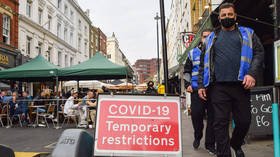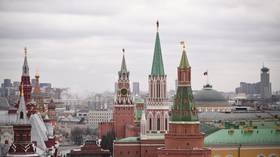Published without fanfare, the proposals that show vaccine passports ARE on the way in the UK
After months of flip-flopping and contradictory statements, the British government has finally come clean and revealed the scenarios where Covid vaccine passports could become a reality in the months ahead.
Anyone by this point accustomed to the UK government’s endless policy reversals and broken promises over the course of the pandemic will be entirely unsurprised to learn that officials have at long last very quietly revealed that “mandatory Covid certifications” – a circumlocutory, Orwellian euphemism for vaccine passports – are on the way.
It was only two-and-a-half weeks ago that Health Secretary Sajid Javid stated unequivocally that vaccine passports would not be necessary for attendees of crowded establishments and events, as “we shouldn’t be doing things for the sake of it.” Later that same day, Prime Minister Boris Johnson reiterated the minister’s declaration, stating he was determined to end all “necessary but intrusive measures” instituted during the pandemic, due to the UK’s “vaccine defences.”
Also on rt.com As BoJo prepares Britain for another winter of Covid restrictions, it’s still not enough for the hardlinersThis in itself represented a complete volte-face from just a few days prior, when Vaccines Minister Nadhim Zahawi suggested that passports would be mandated at the end of September, as they were the “best way” to keep the night-time industry’s lights on. His proposals sparked significant outcry, for it was only in May that UK citizens had been assured there was “no chance” legislation facilitating passports’ implementation would be passed, and plans to that effect had been permanently scrapped.
Under Zahawi’s draft scheme, Britons would have been compelled to show proof of full vaccination, negative PCR test result, or that they’d finished self-isolating after testing positive, in order to gain entry to nightclubs, bars and other popular gathering spots. Nonetheless, it’s clear plans to go far further have been on the drawing board for some time. They’ve now been published in an almost 5,300-word-long whitepaper, obliquely titled ‘Proposal for mandatory Covid certification in a Plan B scenario’.
It outlines how the measure would be put in place in the event ‘Plan B’ is activated after Covid cases overwhelm the NHS, in conjunction with social distancing directives and face mask mandates in certain settings.
If adopted, “mandatory vaccine-only certification” would be introduced for 18-year-olds and above at all: nightclubs and other venues open after 1am “with alcohol, music and dancing”; indoor events with 500 or more attendees “where those attendees are likely to stand and mix to a significant degree”; crowded settings with 4,000 or more attendees “where those attendees are likely to stand, or move around during the event,” such as outdoor festivals and any settings with 10,000 or more attendees, “such as large sports and music stadia.”
Negative test results, or proof of natural immunity after having recently recovered from the virus, won’t be accepted. Whitehall reportedly “hopes that it would not be necessary” to impose vaccine mandates on other settings, but this “cannot be entirely ruled out,” which hardly inspires confidence. Furthermore, Whitehall is specifically soliciting public feedback on the plans, particularly in respect of whether citizens feel the current list of settings that will be made subject to the mandate is “too narrow.”
In justifying the wide-ranging changes, the proposal notes that vaccine mandates “could allow settings that have experienced long periods of closure to remain open,” which is “preferable to closing venues entirely or reimposing capacity caps or social distancing.” Moreover, it alleges that as vaccines “reduce the likelihood of someone becoming infected,” vaccine certification therefore reduces the risk of onward transmission if an infected person does enter a venue.
The specifics of the proposal were reportedly determined “based chiefly on public health evidence,” and also informed by the government’s official review of vaccine certificates published in July – it found the measure “could provide a means of keeping events going and businesses operating if needed over the autumn and winter.”
Which sounds fair enough, until one considers that same review ruled Whitehall “will not mandate the use of Covid-status certification as a condition of entry for visitors to any setting,” on the basis that the “burden” of such a mandate would be “disproportionate” to any public health benefit accrued.
This seismic policy shift is even more baffling considering the withering contents of a parliamentary committee report issued in June, which conspicuously attracted very little mainstream media attention. Asserting firmly that “Covid passports are not the answer” to effectively managing the pandemic, the cross-party group of MPs were said to be “entirely unconvinced by the case for their introduction,” and warned they had the potential to “cause great damage socially and economically.”
“As vaccine uptake statistics indicate, any covid certification system will be a discriminator along the lines of race, religion and age… It would be established at great cost for rapidly diminishing returns,” committee chair and Conservative MP William Wragg commented. “Frankly, the government needs to scrap any idea of introducing covid passports. They are unnecessary and there is no justification for them in the science and none in logic.”
The committee’s concerns are entirely understandable. After all, a piece of paper or QR code noting that the bearer has been double-vaccinated tells you nothing about whether they’re infected, let alone whether they could dangerously spread the virus. A study from Imperial College issued in August found currently available vaccines are around 50% effective in preventing infections. The same month, Oxford University researchers published a paper that found the risk of an individual spreading the virus was roughly the same whether they’d been double-vaccinated or not.
In countries such as France, the imposition of vaccine passports serves the unambiguous purpose of coercing a reluctant citizenry into receiving their jabs, by imposing impossibly onerous restrictions on daily life for anyone who resists. Such strongarming would potentially contravene the law in the UK, given that under the Public Health Act 1984, forced vaccinations are illegal – yet, 82.5% of the country’s population aged 16 and over have electively received both injections. In fact, excessive pressure on citizens to get vaccinated could be dangerously counterproductive.
A quantitative assessment conducted by the London School of Hygiene and Tropical Medicine found vaccine passports would in fact “lower inclination to accept a Covid-19 vaccine,” particularly “if passports were required for domestic use rather than for facilitating international travel,” and especially among “sociodemographic groups that are less confident in Covid-19 vaccines.” As these groups “tend to cluster geographically in large urban areas,” the assessment urged authorities to exercise “extreme caution” in pursuing such an intervention.
Mainstream condemnation of ‘anti-vaxxers’ has steadily reached fever-pitch over the past year, culminating on September 29 with YouTube announcing that it will ban any and all “harmful vaccine content” from its platform, including alleged “false claims” about the inefficacy of vaccines in reducing disease transmission.
However, not a single one of the politicians, journalists, pundits, or government officials who have so aggressively hurled brickbats at vaccine hesitant people and lockdown scepticssince the pandemic began has apparently stopped to consider whether it is precisely the hostile environment they advocate and seek to enforce in respect of such individuals that may account for their dissent.
Such an interpretation is amply borne out by the London School of Hygiene and Tropical Medicine’s assessment – but one needn’t take their word for it. In the UK, between 1840 and 1898, Parliament passed a series of Acts regarding the country’s vaccination policy. The second instalment, in 1853, made vaccinations, and resultant vaccination certificates, for new-born children mandatory, with severe penalties for any parents who failed to comply.
The Act was so viscerally hated, it has been compared to a prophylactic, in that Britons were purportedly willing to avoid sex altogether to avoid flouting its stringent rules – a dedicated National Anti-Compulsory Vaccination League also emerged, with objectors wilfully getting themselves imprisoned in protest, and hundreds of thousands taking to the streets to voice their discontent.
Also on rt.com Arguing children need vaccines for their mental health & social development is scientifically illiterate & morally reprehensibleSo it was that in 1896, a Royal Commission was formed to examine the issue – it ultimately recommended that all coercive penalties related to vaccination be abolished, with parents allowed to choose whether they vaccinated their children, and whether or not they sought a certificate proving it. This was enshrined in law two years later, and within a decade the League had faded into virtually total irrelevance.
Such history begs a very obvious and potentially grave question – if vaccine certification failed so miserably in Victorian times, why on Earth is it back on the table now?
Think your friends would be interested? Share this story!
The statements, views and opinions expressed in this column are solely those of the author and do not necessarily represent those of RT.
















